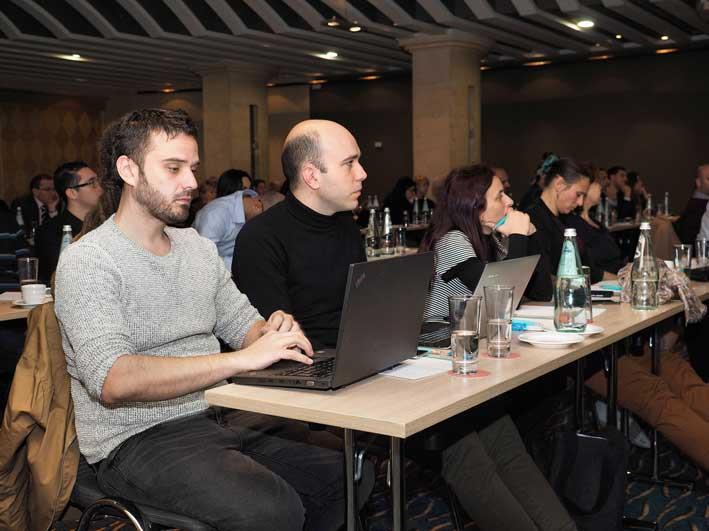Pioneers in the Blockchain and cryptocurrency industries gathered yesterday morning to discuss a practical approach to the innovative and immensely disruptive technologies, such as how it may be used in business and implementation of smart contracts.
FinanceMalta, a public-private entity tasked with promoting Malta as an international financial centre, has organised a series of educational conferences, or ‘clinics’ on how Blockchain technology and cryptocurrency works, how it can be utilised as well as the current challenges it is facing.
The buzz surrounding such technology has increased over the past two years, with the most exciting feature is the ability to cut out middle-men such as banks to carry out a transaction between two parties.
Concern has also been expressed, more so to do with cryptocurrency, over a lack of know-your-client protocols which could allow illicit activities to flourish.
While the technical experts surrounding the technology continue to tweak and improve its service to meet current global demands, the rest of us are still trying to keep up with what the whole thing is all about, and more importantly how it can help.

Photos Michael Camilleri
What is Blockchain technology?
Blockchain technology is an ever-growing list of records, called blocks, which are linked and secured using something called ‘cryptography’. Each record has a link with the previous record, or block, and contains a timestamp as well as transaction data.
Thanks to this technology, issues such as unregistered individuals coming from poverty-stricken regions can be identified, provided with aid and other assistance.
Another example of how Blockchain technology can assist in real-world issues is for instance, when the records of a war-torn country are completely destroyed. A medical doctor coming from war-torn Syria, for instance, would be able to have that academic certificate or title contained and protected within Blockchain technology. As it stands, such a person coming from Syria or other war-torn areas would have to start their lives from scratch without any proof of the qualifications they had worked for in their home country.
Blockchain was implemented as a core component of the digital currency bitcoin, where it serves as the public ledger for all transactions on the network. By using a Blockchain, bitcoin became the first digital currency to solve the double spending problem without requiring a trusted administrator and has been the inspiration for many additional applications.

How can Blockchain be used in business?
Addressing the audience was Malta’s very own Blockchain pioneer, Steve Tendon, who developed Malta’s National Blockchain Strategy, approved by Malta’s Cabinet in April 2017.
He is also the founder and president of the Blockchain Malta Association.
Tendon began his address by showcasing a small seal, a type of sticker, on his physical notebook. He quipped that despite pushing for this innovative technology, he still takes down notes on a notebook, using pen and paper.
He then used his smartphone to load an application which reads specific details about the object which the seal is attached to.
Tendon explained that through this technology, one can use a mobile application to discover things around you, and even make purchases online.
The idea is that through an application, one can read specifics about products in the vicinity. Some stickers require physical contact of the mobile device and the seal, while others work on low-energy Bluetooth and have a longer range.
“If you purchase an expensive handbag, you can insure it on the spot. You can verify that specific items are really what they claim to be. The key notion is that every one of these identity components contains cryptographic keys, and through low energy blue tooth it connects with another device and looks up the information on the Blockchain, check and check that it is correct.

“We have all been to airports and there are many shops there. Imagine that space could be extended by vendors. Imagine with your phone you can interact with that thing and get lots of information. You can buy it on the spot and the vendor can then use traditional infrastructure. The point of sale could multiply by several factors. This also has implications on cost savings,” he told the audience.
Christoph Mussenbrock, the CEO and Founder of Etherisc, delivered a technical presentation about the role of insurance in the innovative technology and the use of smart contracts which any business can acquire and tweak to modify its particular needs.
“If we provide a toolbox of predefined audited secure contracts, anybody can use them and copy them. Everything will be open sourced. Companies can copy the contracts, modify them to their needs and make use of them.”
Speakers Dan Verowski, a consultant at Moonity and Leon Siegmund and the founder of Bitcoin Club Malta spoke at length about how to go about buying bitcoin, how to avoid scams and ‘sh*tcoins’ and the most vital terminology one needs to know before entering the cryptocurrency world.

FinanceMalta chairman urges widespread participation for cryptocurrency consultation document
Closing off the seminar, Chairman of FinanceMalta Kenneth Farrugia delivered a speech where he stressed the importance, both locally and internationally, for participation and feedback in the currently open consultation document on cryptocurrency.
He also said that last October, the Malta Financial Services Authority (MFSA) issued a consultation document on funds investing in cryptocurrency.
Farrugia stressed the importance of this to guarantee a robust regulatory framework around this technology.
“It will induce a lot of comfort. We have seen some hiccups by banks blocking crypto trades for understandable reasons. Having a robust framework will attract businesses and create the necessary comfort and certainty for the technology to flourish”.
He described how 24 countries are actively involved in Blockchain technology, however a national framework set up in Malta would be the first of its kind, on such a massive scale.
Farrugia went on to say that around 90 banks globally are working to get Blockchain into their operations, and that engagement and attendance of these clinics organised by FinanceMalta is essential to spread awareness and information.